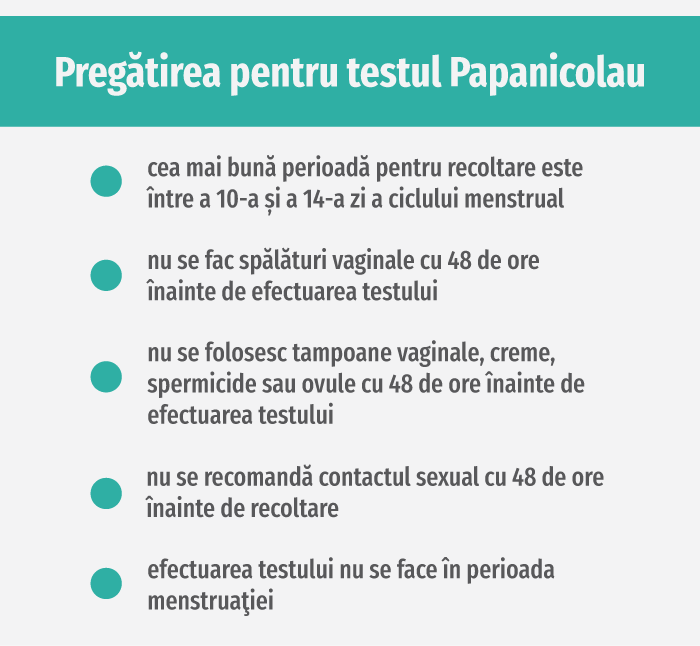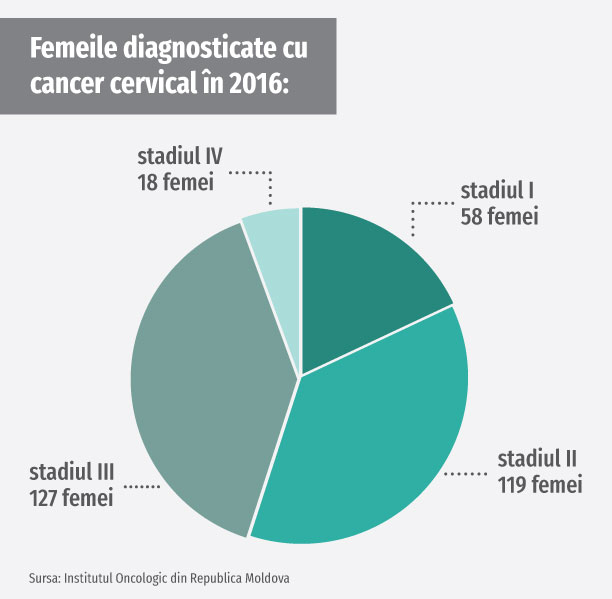In the summer of 2012, Teodora noticed that her mother had changed. She spoke less, she was sad and passive. When asked if anything bothered her, Elena repeatedly insisted that everything was fine. But Teodora, her daughter, could not rest. One day, when her mother was not home, the young woman talked to her father. “My dad and I have always had a special relationship, we always spoke openly”, the woman says. Asked about what was happening, Teodora’s father took a breath and recognized: her mother suffered from cervical cancer.
A few months earlier, Elena noticed some unusual vaginal leaks. She had no pain or other symptoms. She went to the gynecologist from her district, to a clinic in Chișinău. The doctor advised them to come back when the leak ends, but the leaks were not stopping. When Elena returned to her doctor, the gynecologist established her diagnosis: second-degree cervical cancer. When she got home after the consultation, the woman noticed that the doctor’s papers from the first visit were taken out from the medical card. Elena was desperate.
The news broke down the entire family. Elena, a 44-year-old woman, a teacher, was suffering from cancer, a disease that seemed invincible.
***
In the Republic of Moldova, nearly 4,000 women were diagnosed cervical cancer in 2016. Every year, around 300 new cases are recorded and about 150 women lose the battle with the disease. In other words, every two days, because of cervical cancer, a woman dies.
Like other types of cancer, the cervical one starts from the abnormal development of cells lining the surface of the cervix. The disease affects more frequently the sexually active women aged over 30 years. “However, scientists have failed to identify the categories of people prone to cervical cancer, nor have they managed to make the list of risk factors”, says Veronica Ciobanu, an oncologist at the Oncological Institute in Chișinău.
The most common cause of cervical cancer is the Human Papilloma Virus (HPV). This virus is one of the most widespread sexually transmitted infections and has over a hundred forms. In most cases, HPV infection does not show symptoms, and our immune system destroys the virus within two years. However, of the over one hundred forms of the virus, 12 types are associated with human cancer. Persistent infections with the two most common types of HPV (16 and 18) are responsible for 70% of all cervical cancer cases.
“Chlamydia infection is another risk factor for cervical cancer”, continues the onco-gynecologist. The contraceptives used for more than five years and a history of multiple pregnancies are among the causes of cancer. “Women with a weakened immune system or the smoking women are at high risk. This may be due to the harmful effects of substances from tobacco”, explains the specialist.
***
After discovering the torn sheets, Elena did nothing. She was too scared of the diagnosis to face her doctor. Teodora, meanwhile, was getting documented on the topic. “I read everything I’ve found about cervical cancer to understand where we are and what we have to do”, the young woman says. Browsing the internet, Teodora found dozens of stories of surviving women.
“It was just two of us when I told my mother: I know what’s happening to you. You have no reason to be afraid because we can stop this.” On the internet, women who survived were telling encouraging messages. Elena turned away from the computer, she did not want to look. The word “cancer” has caused her panic attacks. When she had to talk about the illness, he could not help crying.
The whole family mobilized to get Elena out of the depressing, paralyzing state she was in. “We did not involve mother in household chores. As the kitchen stayed in my jurisdiction, I tried to prepare food from as many vegetables and fruits as possible”, says Teodora. That’s how she found out that the lemon and the grapefruit kill carcinogenic cells and that canned food is not recommended.
Diagnosing a cancer family member is a challenge for all. “The sick person will go through the period of denial, despair, and refuse to believe that all this is happening to him”, explains psychologist Tatiana Chirev. This phase is followed by acceptance and ends with the patient’s desire to heal. Support of the family at these times is essential.
Ignorance gives birth to anxiety, says the psychologist. “The best weapon against anxiety is to understand what’s happening to you. Here I am referring to the knowledge of the disease – what changes, how the treatment takes place, what are its side effects”, continues Tatiana Chirev. The specialist recommends learning about the diseases from safe sources and joining support groups for people diagnosed with cancer. “Equally important are the meetings with friends, time spent with family, books, movies – all this can reduce fear and anxiety”, tells the expert.
***
Cervical cancer is considered a silent killer because it does not show symptoms and develops slowly for many years. In the advanced stage of the disease, it is possible for the patient to experience pain during sexual contact, bleeding, and vaginal discharge.
Unfortunately, 43% of women diagnosed in 2016 in Moldova were taken under surveillance only in the 3rd and 4th stages. At this stage, treatment is more aggressive, and survival rates – lower. “Our goal is not to get to the advanced stages when the woman goes through an invasive surgery, radiation therapy, chemotherapy”, explains onco-gynecologist Veronica Ciobanu. Before the development of cancer itself, the cervical cells suffer some abnormal transformation. These processes can be detected in time if the woman goes through gynecological control every year and performs the Babeș-Papanicolau test at least once every three years.
 How does the cytological test take place? The doctor uses a tool called the speculum, which keeps the vagina open, and with a spatula or a fine brush, harvests cells from the cervix. The procedure lasts two to three minutes and can be unpleasant, but not painful. After the test, the woman can continue her day without any limitations. The Babeş-Papanicolaou test saves lives because it detects pre-cancerous cells or discovers the disease in its early stages when complete healing is guaranteed.
How does the cytological test take place? The doctor uses a tool called the speculum, which keeps the vagina open, and with a spatula or a fine brush, harvests cells from the cervix. The procedure lasts two to three minutes and can be unpleasant, but not painful. After the test, the woman can continue her day without any limitations. The Babeş-Papanicolaou test saves lives because it detects pre-cancerous cells or discovers the disease in its early stages when complete healing is guaranteed.
Last year, the Ministry of Labor, Health and Safety launched the project “Prevention of cervical cancer in the Republic of Moldova”. Among the planned activities, the authorities plan to train specialists from all regions of the country to properly perform the cervical screening test. The project has a budget of 1,2 million dollars, will last for three years and will be implemented in cooperation with several external partners. If the project has the expected impact, cases of cervical cancer will decrease by 20% by 2025.

As mentioned earlier, the most common cause of cervical cancer development is Human Papilloma Virus (HPV). The risk of HPV infection can be diminished by using a condom, but it does not offer total protection. HPV transmission occurs from intimate contact to the skin and includes all types of sex (vaginal, oral and anal).
The HPV vaccine is considered by the medical community as the most effective method of prophylaxis. The HPV vaccine targets the most dangerous and frequent types of virus, responsible for cervical cancer cases. Australia was among the first countries to introduce the vaccine into the vaccination program in 2007. The vaccine is also being carried out in countries such as Great Britain, Denmark, Sweden and the United States of America. To date, 175 million doses have been administered worldwide.
The World Health Organization recommends vaccinating 9-14-year-old girls until the start of sexual life. The vaccine is composed of proteins that resemble the surface of the HPV virus. It does not contain genetic material of the virus itself. Due to its similarity to the virus, the vaccine stimulates the immune system to produce protective antibodies against HPV.
 In Moldova, during the years 2017-2018, approximately 15000 girls aged 10 years will be vaccinated for free against HPV. The Republic of Moldova received a free vaccine batch for two years after the Ministry of Health submitted a request to the Global Alliance for Vaccines. In Moldova, vaccination will be performed with the Gardasil vaccine that protects against virus types 6, 11, 16 and 18. Gardasil was the first anti-HPV vaccine, developed and tested since 2002.
In Moldova, during the years 2017-2018, approximately 15000 girls aged 10 years will be vaccinated for free against HPV. The Republic of Moldova received a free vaccine batch for two years after the Ministry of Health submitted a request to the Global Alliance for Vaccines. In Moldova, vaccination will be performed with the Gardasil vaccine that protects against virus types 6, 11, 16 and 18. Gardasil was the first anti-HPV vaccine, developed and tested since 2002.
As vaccination is optional, the decision remains with the parents, and the opinions are divided. Marilena, the mother of an 11-year-old girl, refused to vaccinate her daughter. “We found data on the side effects of the vaccine, they are serious. In our country, they will practically test the population. I do not take this for my child”, Marilena says. Tatiana, the mother of a 10-year-old girl, has a different opinion. “I have found information that this vaccine is being administered in the UK and Denmark. It was decisive for me to read an interview with a doctor from the Oncology Institute, who told mothers to do as she thinks, but to know one thing: cervical cancer flourishes in Moldova. This has led me to vaccinate the baby immediately. “
“We have always advocated vaccination and talked about its importance for little girls and their impact”, says onco-gynecologist Veronica Ciobanu. According to the doctor, the adverse effects of the anti-HPV vaccine are rare and similar to those of other vaccines: pain at the point of vaccination, fainting, fever or a headache.
***
After establishing the diagnosis, Elena went to the Oncology Institute, where she had a doctor who encouraged her day by day. “My mother’s doctor was a strong woman, that helped her a lot”, says Teodora. Elena took a radiotherapy course. The sessions were tiring and made her feel powerless. The woman finally managed to defeat the disease. Since then, she has gone regularly to a doctor to ensure that the battle has been won.
Elena finds it too hard to talk about cancer. Every time she remembers what she’s been through, her eyes are filled with tears. Because of this, the voice of Teodora is much more present in this article. “The doctor told me I could follow the same path as my mother, so I go to check every half year”, she says. Teodora is not afraid, she knows – cervical cancer can be prevented by systematic control and testing.



